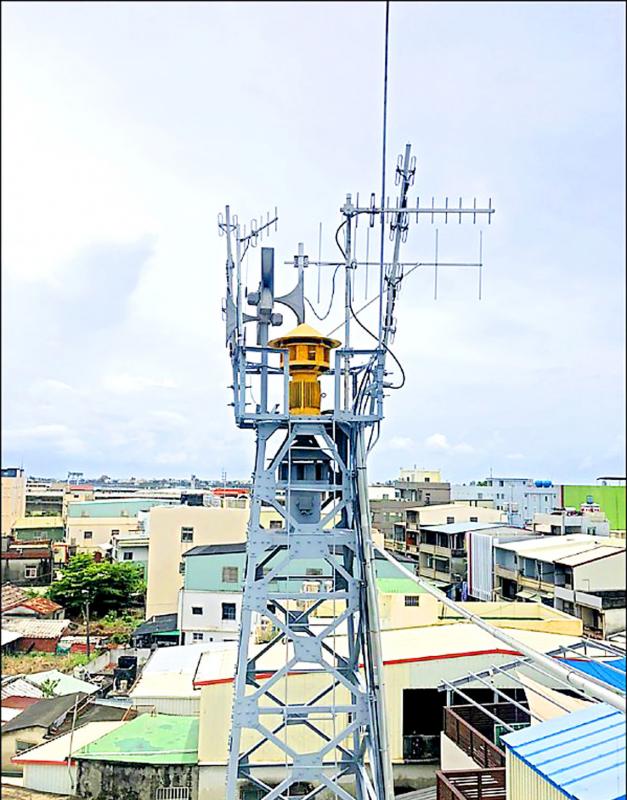About 350,000 people live in areas out of audible range of air-raid sirens, a National Audit Office report has found.
The people live in 38 towns and boroughs spread across seven cities and counties, the report said, citing information compiled by the National Police Agency in November last year.
The alarms are crucial for ensuring public safety in the event of an air attack or major natural disaster, it added.

Photo: Tsai Tseng-hien, Taipei Times
The National Police Agency’s Civil Defense Office completed a survey on Nov. 20 last year that used QGIS, an open-source geographic information system, to analyze the reach of the country’s 1,435 air-raid sirens.
The survey focused on boroughs and villages with a population of at least 9,605 people per square kilometer, and administrative areas with populations of at least 6,286 people.
The office found that in 38 communities across Taipei, New Taipei City, Keelung, Taoyuan, Taichung, Kaohsiung and Hsinchu County, people were unable to hear air-raid sirens due to their distance from the nearest siren or other geographical factors.
The Ministry of the Interior on Monday urged the governments of the affected cities and county to make necessary improvements.
Before more sirens are installed, communities could rely on police sirens, school public address systems and community offices to assist in alerting community members, it said.
The ministry said that the military would also coordinate with cellphone service providers to send text message warnings when emergencies occur, adding that it would test the system during the next annual Wanan military drill, when the public receives warnings to stay indoors while drills take place.
The public is unfamiliar with emergency procedures and unaware of where they can take cover during an emergency, Democratic Progressive Party Legislator Wang Ting-yu (王定宇) said, adding that the government should educate the public about emergency response drills.
Such drills would be especially important for those living near administration offices and military facilities, which would most likely be attacked in an armed conflict, he said.
“The Wanan drills are scheduled and people know to stay indoors, but in the event of a sudden attack, people are unlikely to know where to find safety,” retired air force lieutenant general Chang Yan-ting (張延廷) said.
Given the threat of military conflict with China, the government must ensure that people are informed about how to respond, he said, adding that the government should hold drills for the public.

CHANGING LANDSCAPE: Many of the part-time programs for educators were no longer needed, as many teachers obtain a graduate degree before joining the workforce, experts said Taiwanese universities this year canceled 86 programs, Ministry of Education data showed, with educators attributing the closures to the nation’s low birthrate as well as shifting trends. Fifty-three of the shuttered programs were part-time postgraduate degree programs, about 62 percent of the total, the most in the past five years, the data showed. National Taiwan Normal University (NTNU) discontinued the most part-time master’s programs, at 16: chemistry, life science, earth science, physics, fine arts, music, special education, health promotion and health education, educational psychology and counseling, education, design, Chinese as a second language, library and information sciences, mechatronics engineering, history, physical education

The High Prosecutors’ Office yesterday withdrew an appeal against the acquittal of a former bank manager 22 years after his death, marking Taiwan’s first instance of prosecutors rendering posthumous justice to a wrongfully convicted defendant. Chu Ching-en (諸慶恩) — formerly a manager at the Taipei branch of BNP Paribas — was in 1999 accused by Weng Mao-chung (翁茂鍾), then-president of Chia Her Industrial Co, of forging a request for a fixed deposit of US$10 million by I-Hwa Industrial Co, a subsidiary of Chia Her, which was used as collateral. Chu was ruled not guilty in the first trial, but was found guilty

DEADLOCK: As the commission is unable to forum a quorum to review license renewal applications, the channel operators are not at fault and can air past their license date The National Communications Commission (NCC) yesterday said that the Public Television Service (PTS) and 36 other television and radio broadcasters could continue airing, despite the commission’s inability to meet a quorum to review their license renewal applications. The licenses of PTS and the other channels are set to expire between this month and June. The National Communications Commission Organization Act (國家通訊傳播委員會組織法) stipulates that the commission must meet the mandated quorum of four to hold a valid meeting. The seven-member commission currently has only three commissioners. “We have informed the channel operators of the progress we have made in reviewing their license renewal applications, and

Taiwan-based publisher Li Yanhe (李延賀) has been sentenced to three years in prison, fined 50,000 yuan (US$6,890) in personal assets and deprived political rights for one year for “inciting secession” in China, China's Taiwan Affairs Office spokesman Chen Binhua (陳斌華) said today. The Shanghai First Intermediate People’s Court announced the verdict on Feb. 17, Chen said. The trial was conducted lawfully, and in an open and fair manner, he said, adding that the verdict has since come into legal effect. The defendant reportedly admitted guilt and would appeal within the statutory appeal period, he said, adding that the defendant and his family have